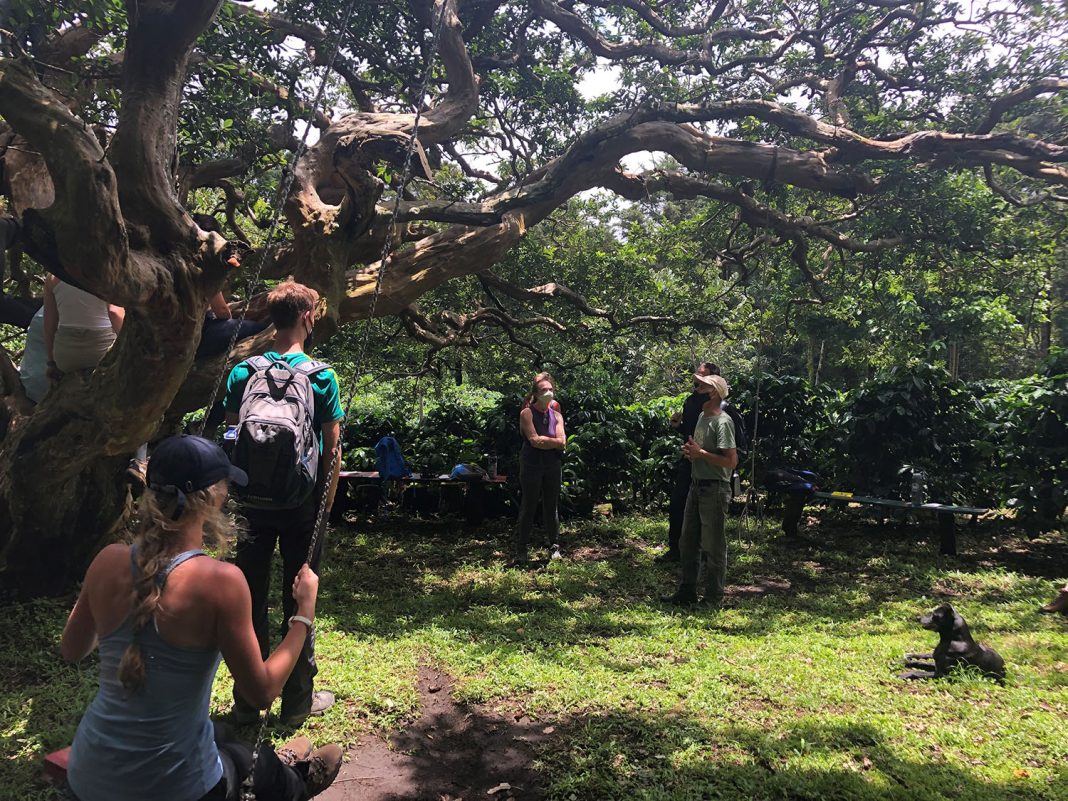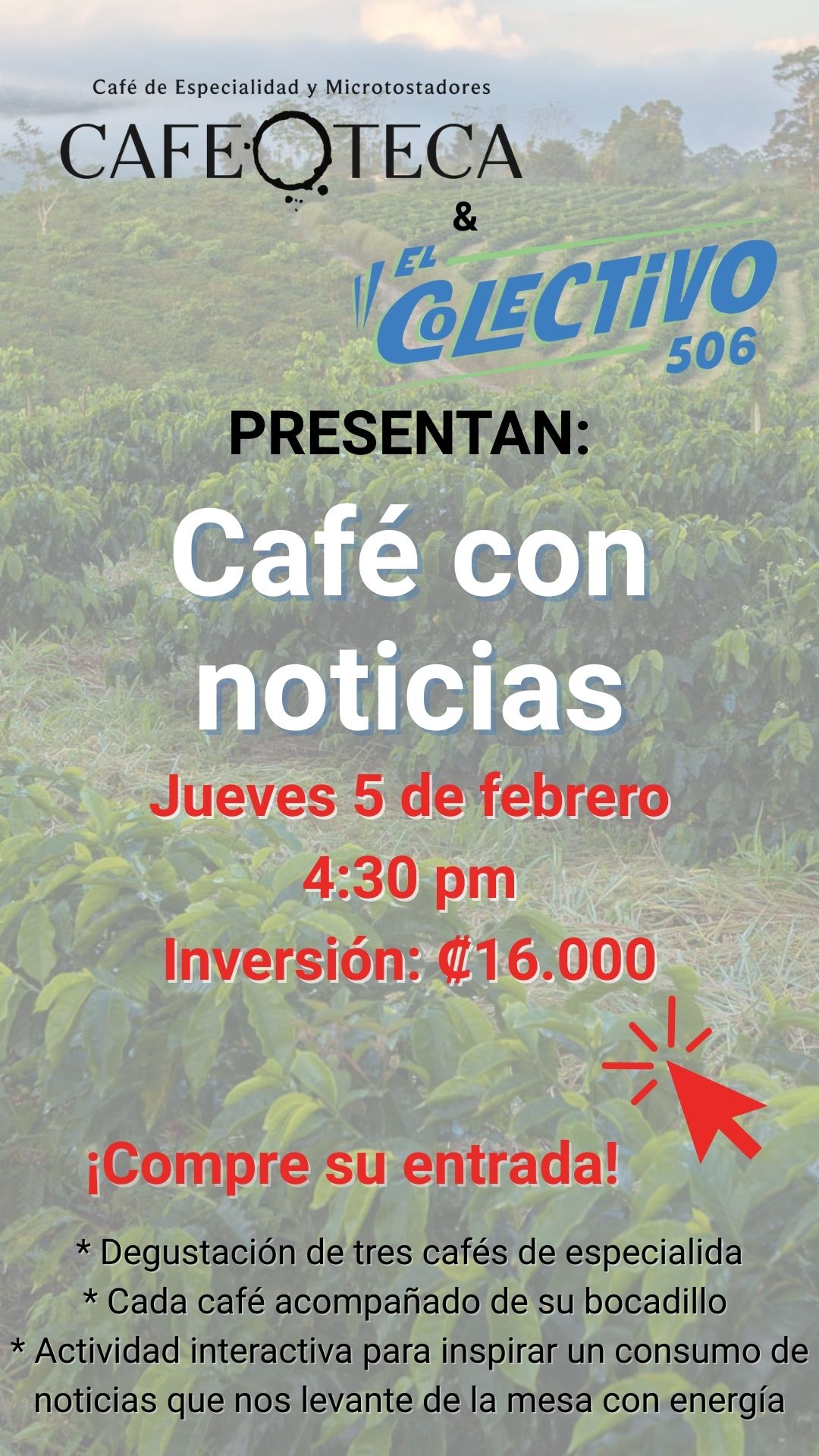Golden purple cacao pods hang from tree trunks as I wind my way toward the intense chocolate scent of roasting cacao at La Iguana Chocolate Farm in the village of Mastatal. La Iguana co-owner Jorge Salazar explains how planting mixed tree species attracts diverse plants and wildlife to enhance cacao production, including the macaws using the biological corridor to pass over the cacao agroforesty system.
Guillermo Vargas shares similar lessons under a huge guava tree at LIFE Monteverde Coffee Farm in Monteverde. Although the tree reduces the number of coffee plants in the field and coffee beans to sell, it provides fruit for people and attracts birds while enhancing the coffee tours, along with at least another dozen “biological services.”
This diversity mindset is also encapsulated by Gabriel Calderón during a tour of El Toledo Coffee Farm in Atenas: “Before, we were throwing away all the coffee fruit just to get to the seed to make coffee. We realized we had to diversify our inputs and products if we wanted to have a healthy family, farm and make money.”
Each of these sustainable producers reconnects visitors to our cultural and ecological roots through agricultural tours—tours that are more in demand now that we’ve had time to reflect on our own food insecurity during the pandemic.
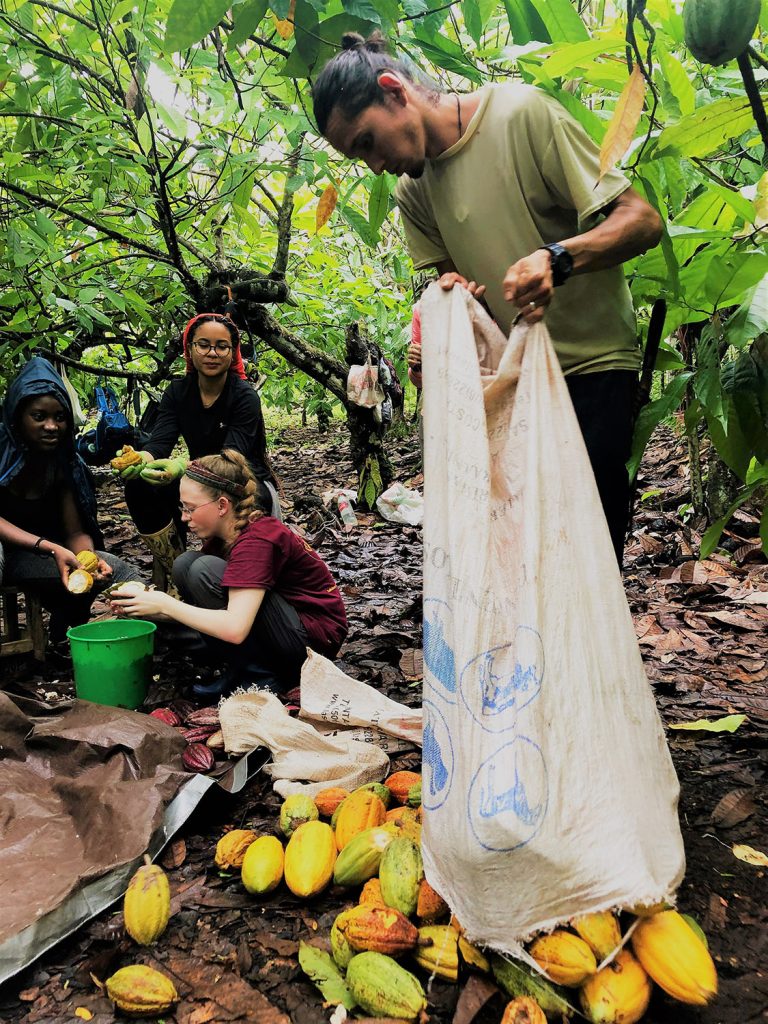
Diversification in farming can mean cultivating more types of crops. It can also apply to more offerings and products available at the farm. People in rural communities have answered the increasing demand for authentic local experiences, especially as COVID-19 restrictions subside, by offering farm tours and food tastings. Rural tourism with a food or agriculture focus, known as agrotourism, has helped farmers diversify income and sell their products directly to travelers.
Agrotourism is a type of sustainable tourism that has been presented as a win-win development solution because of potential environmental and economic benefits. Costa Rica has promoted tourism as a sustainable form of development since the 1980s, which brought approximately 3 million international visitors who spent around US $3 billion in 2019. A weakness of tourism, however, is a tendency towards over-reliance on the earnings that come when times are good, and lack of preparation for the economic consequences when tourism is interrupted.
This became unavoidably clear when Costa Rica closed its borders to all international travel due to COVID-19 in March of 2020. The closure caused a 67.7% decrease in international visitors during 2020, according to the Costa Rican Institute of Tourism. (Read more about the impact of this closure on rural tourism at El Colectivo 506). Some scholars—such as Scott Gössling and C.M.Hall (“Pandemics, tourism and global change: a rapid assessment of COVID-19,” 2020, Journal of Sustainable Tourism) and F. Higgins-Desbiolles (“Socialising tourism for social and ecological justice after COVID-19,” 2020, Tourism Geographies)—think the current decreased growth trajectory can help align tourism with social and ecological limits.
This raises the question: how can tourism communities use this moment to enhance the benefits of tourism without becoming over-reliant on this single source of income?
All three of the agrotourism producers I spoke with emphasize the importance of resilience through diversity. The producers at La Iguana Chocolate Farm in Mastatal, LIFE Monteverde Coffee Farm and El Toledo Coffee Farm in Atenas, we discussed the challenges they faced during Covid, how they adapted, and what they see for the future of agrotourism in Costa Rica.
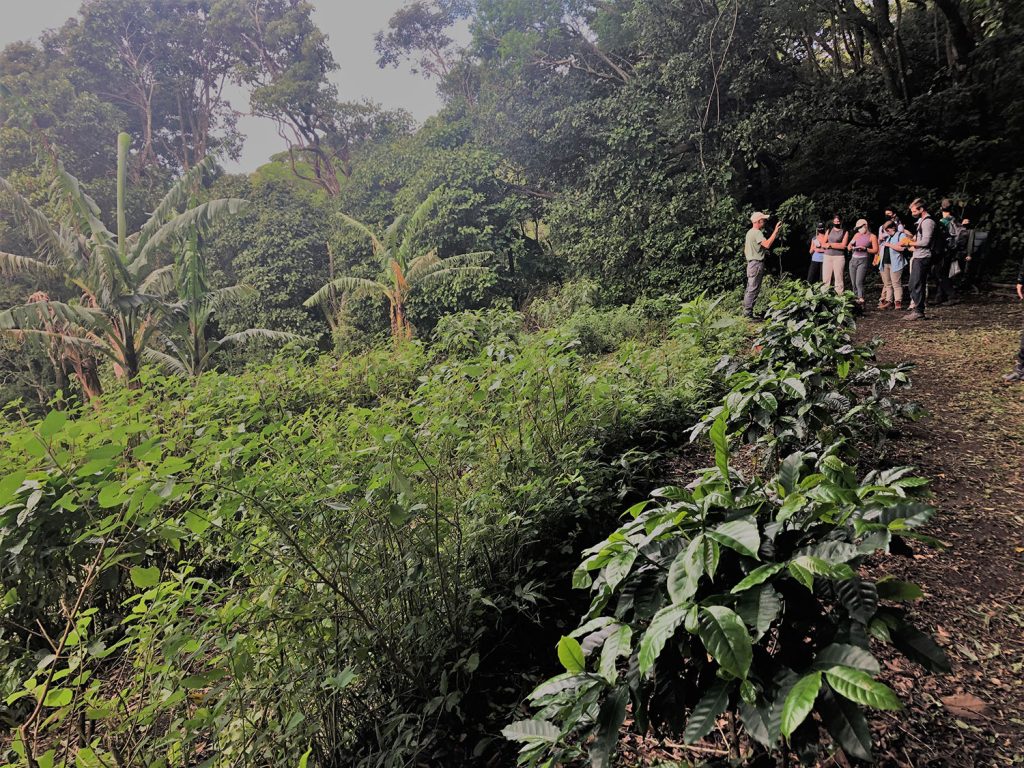
All three farms immediately lost income from tours when the lockdown began. Product sales from the tours also disappeared. La Iguana Chocolate Farm made half of the income from chocolate product sales at their onsite shop after the tours. To make up for this change, they set up a chocolate stand at the town crossroad to capture local and pass-through transit sale opportunities that they hadn’t considered before.
In addition to the loss of tours and coffee sales on tours, El Toledo Coffee Farm also stopped selling at the local market because two of their family members are immune-compromised. Instead, they started offering home delivery and no-contact coffee pick up at the farm. Changing their distribution methods brought some increase in market sales due to the convenience of delivery, a practice they have continued post-lockdown.
While the international travel ban was in force, Costa Ricans began to seek out natural spaces and rural activities. For La Iguana, the nearby La Cangreja National Park is an anchor that attracted national tourists looking for other local activities. Many Costa Ricans took advantage of reduced international tourism to visit the famous Monteverde Cloud Forest Reserve, and some included a visit to the LIFE Monteverde Farm and Café. LIFE primarily relied on direct sales of coffee to a long-time café connection in the United States and local sales at their two cafes.
All three farms reported extreme stress from uncertainty and financial hardship. Each of these established farms had some savings to face these challenges. Newer businesses and those with debt were more likely to close. For example, family employees at LIFE Monteverde reduced or eliminated their own salaries to continue paying employee coffee pickers. They addressed food insecurity caused by reduced incomes by growing food crops like beans and vegetables alongside their coffee for employees.
At La Iguana, though faced with a stressful situation, they knew they would make it through because they can grow their own food. They say that food security and farming skills are of growing interest to visitors who are requesting agroecological farming skills classes.
Resilience has been etched into these small businesses by the hard times they faced before the pandemic, sometimes because of drops in crop prices or the switch to agroecological farming. When they stopped applying fertilizers to their crops, they experienced smaller harvests until they could increase soil fertility organically. During these tough times, the farmers worked other jobs and created innovative solutions, as they have during the pandemic.
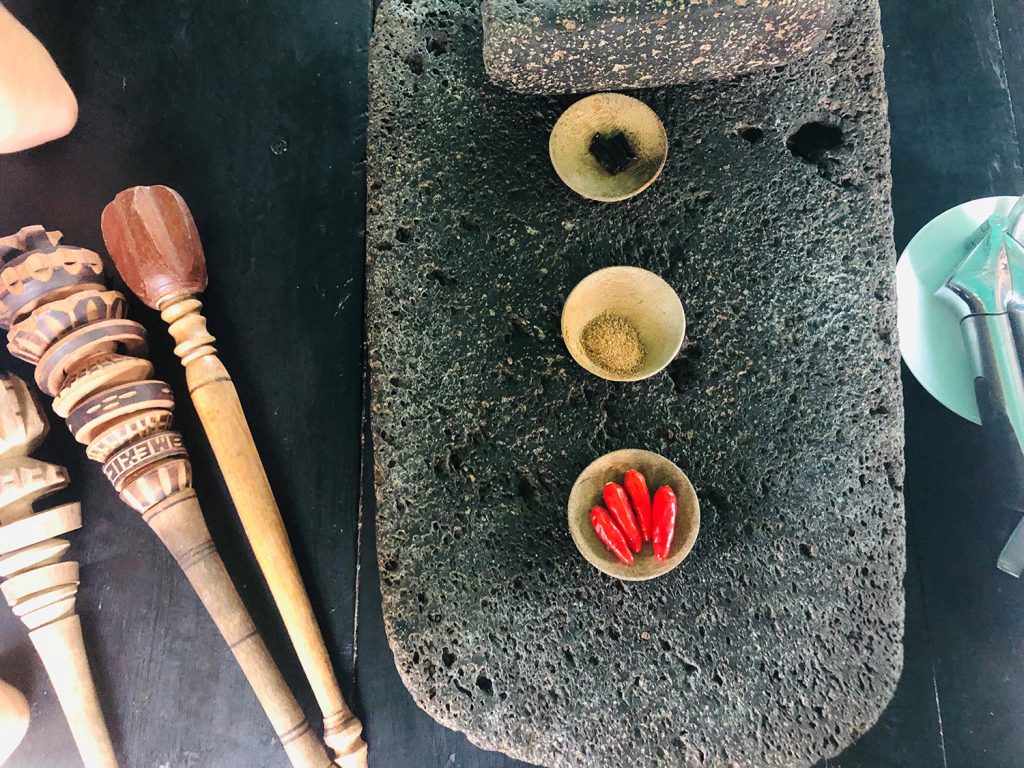
The “downtime” created an enforced rest period that the farmers had not experienced before. They had rushed to keep up with increasing tours and product sales, on top of running the farms, usually without time to reflect on or change the direction of growth. During pandemic restrictions, La Iguana used the time to build a new chocolate processing room and renovate their tourism facilities. They also plan to hire a tour guide so they can devote more time to producing chocolate.
As usual, the most challenging times often provide opportunities. The slow return of tourism has created space to consider how to balance their goals of farming, creating food products and offering tours. LIFE Monteverde Coffee Farm has tried to create a better balance between food and coffee production at their farm and support increased local farming efforts prompted by the drop in tourism. At Toledo Coffee Farm, tourism accounted for 30% of their income but has been growing in recent years. Since the pandemic, they have started to limit the number and size of tours to balance farming and educational tourism activities.
The fear for our physical and economic health during the pandemic cannot be downplayed or forgotten. Those in the tourism industry experienced some of the most abrupt and challenging disruptions. Their recovery replicates the values of their sustainable farms. Diversity, whether in farming or business, makes us stronger. As tourists, we can support these efforts by selecting diverse tourism options that will enhance our positive environmental and social impacts. We also enhance our own connections to nature and culture by supporting sustainable national food producers—and what an abundance of rich food experiences are being grown throughout Costa Rica.


